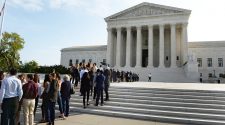Academics have warned that changes to competition law to shut down environmental boycotts could breach the constitution, as some Coalition MPs are expressing nervousness privately about Scott Morrison signalling a controversial crackdown last week.
The attorney-general Christian Porter has nominated activist group Market Forces as the intended target of the Coalition’s efforts to temper activism, flagged by Morrison during a combative speech in Brisbane last Friday, but some government MPs are confused about precisely what is being proposed, and are concerned about the potentially negative implications for freedom of expression.
The attorney general has accused Market Forces of trying to “impose their political will on companies across the country through widespread, coordinated harassment and threats of boycotts” and revealed that environmental litigation and litigation funders are also in the government’s sights.
Porter’s comments clarify a speech given by Scott Morrison on Friday suggesting the government will apply penalties to secondary boycotts done for the dominant purpose of environmental protection, which are currently permitted.
University of New South Wales law school dean Prof George Williams said the move would risk breaching the implied freedom of political communication in the constitution.
“We would likely see a challenge mounted in the high court,” he told Guardian Australia.
Prof Graeme Orr of the University of Queensland said it was “hard to be definitive” as the government was still at the stage of “flying kites” in its secondary boycott proposal.
But he accused the government of “targeting protests under the guise of a law designed to combat misuse of market power or union power”.
Orr said state governments – not the federal government – were responsible for general police powers and suggested that Morrison had “stitched together two separate issues” by linking protests he characterised as anarchistic with competition law powers.
“It’s a constitutional, moral and political minefield in an age where people are more frequently sounding off on social media, encouraging others to put pressure on businesses as the primary or secondary target of a boycott.”
Orr noted that Nationals MP George Christensen has previously advocated a boycott of Ben & Jerry’s ice cream over its stance in favour of same-sex marriage.
Several government backbenchers contacted by Guardian Australia on Tuesday expressed confusion about precisely what the government was championing, but declined to express their concerns on the record given the government is yet to produce a concrete proposition.
In a statement, Porter said the government was considering ways to target “boycotts or protests [that] are designed to deliberately inflict economic harm on Australian businesses that are doing nothing other than lawfully providing goods and services to mining projects”.
Porter claimed that “radical activist groups like Market Forces … punish or threaten to punish hard-working businesses for any association or involvement they may have in mining projects as a deliberate and targeted means of trying to force their own radical political views on companies and workers”.
The attorney general revealed the government was also considering reforms to prevent “the growing presence of litigation funders” in class actions targeting the mining sector and “other areas where activists exploit legal process in a concerted engagement in ‘lawfare’ designed to delay, frustrate and cause unnecessary expense to mining and other legitimate commercial projects and businesses in Australia”.
The chief executive of Market Forces, Julien Vincent, told Guardian Australia it was now clear the government “wants to … stop us going about our work”, but that the work was an “entirely legitimate” means of encouraging companies to pursue better environmental outcomes.
Vincent said the “big risk” was that the government would “impinge on the rights of individuals to use information to choose products and services on the basis of environmental outcomes”.
“If you don’t have groups shine light on that, what you get is quiet Australians – people who don’t have a voice, or a mechanism to speak up.”
In 2014, the Abbott government considered applying penalties to environmental secondary boycotts. In 2015, the Harper competition review said that in the absence of “compelling evidence” on the point, it saw no need for change, although the exception should be reassessed “if such evidence arises from future boycott activity”.
Ian Harper, now dean of Melbourne Business School, said the review had sought to balance the “reasonable claims” of those protesting on environmental or consumer protection grounds with “the rights of businesses not directly involved with the issue to go about their affairs without disruption”.
“Submissions to the review made it clear that, absent an exception on environmental and/or [consumer protection] grounds, an outright ban on secondary boycotts could set the [Competition and Consumer Act] in tension with common law rights to protest and perhaps contravene the broader public interest in doing so,” he told Guardian Australia.
The review also distinguished public advocacy campaigns – which seek to influence consumer and business behaviour – from secondary boycotts which “aim not just to influence but also to hinder or prevent the supply or acquisition of goods or services”.
“The panel considers that, although a public advocacy campaign may damage a business, it does so by attempting to influence the behaviour of businesses and consumers,” it said. “Businesses and consumers are free to make up their own minds about the merits of the campaign.”
On Sunday, Anthony Albanese said it was “very difficult to see” how the government could “stop individuals campaigning about corporate behaviour”.
Albanese described the right to protest as “an important part of freedom of expression” and said that “any Liberal, who is the leader of a Liberal party, seeking to expunge that, is, in my view, very dangerous indeed”.
However, Albanese said protests should be peaceful and conducted “in a way that actually gets support for their cause”, adding that some protests had “alienated people”.














